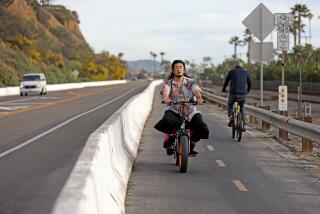Sales of electric bicycles lose momentum
- Share via
When gas prices spiraled toward $5 a gallon a couple of years ago, electric bicycles were wheeling off showroom floors as fast as their motors could move them. The pace has slowed somewhat since then, despite growing interest among Southern California merchants, cyclists, commuters and manufacturers.
“I’m more than considering one,” said Marques Warren, who took an electric bicycle for a test ride at year-old Hollywood Electrics last month and was “thrilled.” The only hitch: the $3,100 he needs to buy it.
The bikes’ upfront costs are expensive, “but when you look at the numbers long term, it makes sense,” said Warren, who recently moved to Los Angeles from Seattle and said he has been spending more than $100 a week on gas commuting to and from his work at a beverage and events company in Hollywood.
“Electric bicycles are an untapped market, especially for commuting,” said Stephen Wittels, who in May opened the Pedal or Not electric bicycle shop and guided tour service in Santa Monica.
Wittels is one of at least half a dozen small-business owners who have opened electric bicycle stores in Southern California in the last 12 months.
Although they are true believers in electric bicycles’ potential as fun, inexpensive and environmentally conscious transportation, few of these new retailers expected the economic slump to be so stubbornly protracted.
Two weeks ago, Currie Technologies in Chatsworth, one of the country’s oldest and largest electric bicycle manufacturers, added its name to the list of new shops. It opened its first Izip retail location in Venice to “prove the viability of this kind of store as a standalone business,” Currie President Larry Pizzi said.
These bikes vary in price from $400 to $7,000 and can move at least 12 mph, with further speed depending on the size of their motors, battery packs and the weight of their riders. They are similar to regular bicycles, giving riders the option of pedaling under their own power or with an electric assist.
In California, they are not considered motor vehicles, nor do they require operators to have a driver’s license or registration. Riders must be 16 or older and wear helmets.
Whisper quiet, they can usually travel about 20 miles on a single charge, said Ed Benjamin of Fort Myers, Fla., chairman of the Light Electric Vehicle Assn., a nonprofit organization that tracks electric bicycle manufacturing.
Nationally, electric bike sales grew steadily to 170,000 units in 2008 from 100,000 in 2005 — only to retreat last year to 150,000 units, said Frank Jamerson, founder of Electric Bikes Worldwide Reports, a service that reports on electric bicycle sales worldwide.
Despite the report’s projections of a doubling in electric bicycle sales this year to 300,000, many new e-bike retailers are experiencing flat or merely modest gains in sales.
In 2008, “we were selling every stitch of product we could lay our hands on because people were desperately seeking alternatives to gas-powered vehicles,” said Pizzi, whose company sold 50,000 e-bikes that year.
Manufacturers and small-business retailers say the market for electric bicycles is evenly divided between baby boomers who enjoy bicycling for recreation but aren’t as fit as they once were, and professionals with short commutes who don’t want to show up for work sweaty.
There are dozens of electric bicycle manufacturers, from well-known brands such as Trek and Schwinn to lesser-known independent makers including Pedego, Currie and Ultra Motor. Yet electric bicycles make up just 1% of the 15 million bicycles sold in the United States each year.
“Everybody’s optimistic about an uptick in the market,” said Don DiCostanzo, co-founder and chief executive of Pedego, an e-bike manufacturer that launched in Irvine in 2009 and projects sales of 3,000 bicycles this year. “I think the U.S. is just a little slow because of awareness and style.”
When Rodene Ronquillo first took a Currie Izip Zuma for a spin, she said she felt “wobbly.” Now the 29-year-old L.A. photographer uses her bicycle to commute to work, run errands and have fun hanging out with her boyfriend, who she persuaded to also buy one.
She thought the $2,000 she paid for the bicycle was completely fair, “considering the benefits,” she said, which include enjoying the fresh air, leaving less of a carbon footprint and having more fun than sitting inside a car.
It’s the powerful 1,000-watt electric bicycles that are selling at Hollywood Electrics, an electric motorcycle and bicycle shop on Fairfax Avenue. Although electric bicycles are the shop’s bestsellers, co-owner Harlan Flagg said sales have not been as brisk as he hoped.
“We get a lot of people who really want one,” said the 29-year-old Flagg, whose shop sells several models from Virginia-based brand E+. “They just can’t afford to pay $3,000 for a bicycle.”
More to Read
Inside the business of entertainment
The Wide Shot brings you news, analysis and insights on everything from streaming wars to production — and what it all means for the future.
You may occasionally receive promotional content from the Los Angeles Times.










